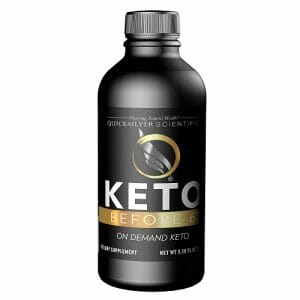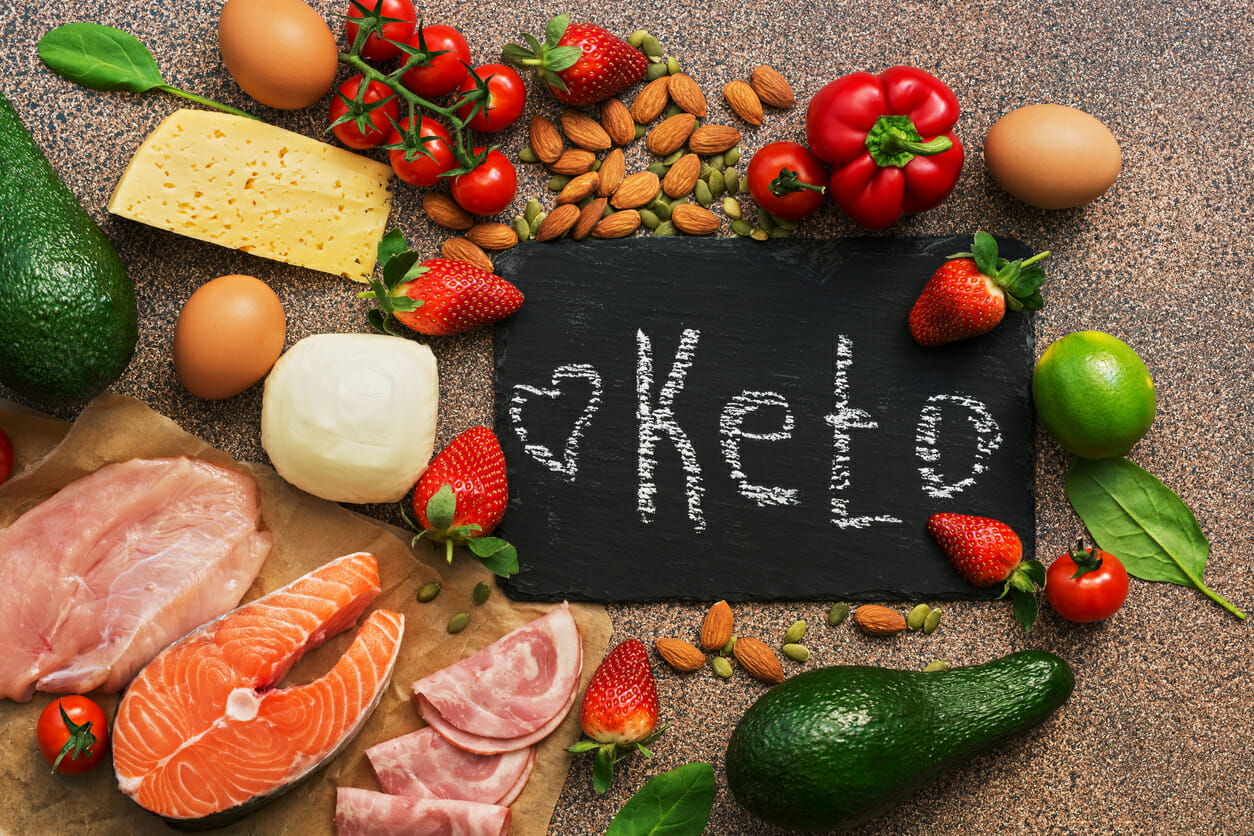How to Boost Ketosis – 6 Powerful Ways to Jumpstart Ketosis in 2019
Can we boost Ketosis in a natural way? That’s what this post answers, and why you want to make sure to include these 6 tricks to get more from your Keto Diet.
In this post, you will learn how Keto Experts use these 6 tricks to boost Ketosis:
- Incorporate Coconut, Avocado, Nut and Olive Oils into your diet
- Experiment with MCT Powder in Your Morning Coffee
- Try Intermittent Fasting or “Fat Fasting”
- Utilize Glucogenesis
- NEVER Exercise in a Fasted State
- Supplement with Quicksilver Scientific Keto Before 6
Before we jump into the 6 tricks, let’s understand how the body enters Ketosis…
Table of Contents
The 2 Ways Your Body Enters Ketosis
Getting your body into Ketosis means 2 things:
- Lowering your Carbohydrate Intake
- Increasing your dietary fat consumption from high quality sources
We know that everyone responds differently on a Ketogenic diet and some take longer to achieve a state of Ketosis than others. We also know that by increasing the amount of Ketones our bodies produce, the less glycogen is needed and the easier it is to access our fat stores. By following a Ketogenic diet, we can see results such as weight loss (everyone’s most favorite), diabetes management and reduction in heart diseases risk factors. Implementing these 6 “Keto Boosts” can help your success on the Ketogenic Diet!
1. Experts Overeat on these 15 “Healthy Fats”
Consuming plenty of healthy fat can boost your Ketone levels and help you reach Ketosis. However, extremely high fat intake doesn’t necessarily translate into higher Ketone levels. We need to look at the types of fat we are consuming. Since fat makes up the highest percentage of a Ketogenic diet (70-80%), we should be choosing high quality sources.
Good fats include:
- Olive Oil
- Avocado Oil
- Coconut Oil
- Nut Butters
In addition, there are many healthy, high-fat foods that are also very low in carbs. Try fatty fish such as Salmon or Mackerel as well as cruciferous vegetables like Broccoli and Cauliflower. Eggs, meat and poultry are also good choices in addition to cheese and yogurt if you don’t have a dairy allergy. Consuming at least 60% of your calories from fat will help boost your Ketone levels.
While many Keto followers avoid fruit for its high sugar content, exceptions can be made for berries like blackberries and raspberries. These anti-oxidant rich fruits are filled with as much fiber as digestible carbs! With the high fiber/high fat content of nuts and seeds, the net carbohydrates in 1 ounce of the following foods are also a good choice:
- Almonds: 3 grams net carbs (6 grams total carbs)
- Brazil nuts: 1 gram net carbs (3 grams total carbs)
- Cashews: 8 grams net carbs (9 grams total carbs)
- Macadamia nuts: 2 grams net carbs (4 grams total carbs)
- Pecans: 1 gram net carbs (4 grams total carbs)
- Pistachios: 5 grams net carbs (8 grams total carbs)
- Walnuts: 2 grams net carbs (4 grams total carbs)
- Chia seeds: 1 gram net carbs (12 grams total carbs)
- Flaxseeds: 0 grams net carbs (8 grams total carbs)
- Pumpkin seeds: 4 grams net carbs (5 grams total carbs)
- Sesame seeds: 3 grams net carbs (7 grams total carbs)
2. MCTs (Medium-Chain Triglycerides)
You may have heard of Metagenics MCT Powder and its effectiveness in weight loss due to its MCT oil concentration. The reason being is that MCT oils are quickly absorbed and sent to the liver to be converted to Ketones (or used for energy). Taking MCT in the form of supplements or coconut oil can effectively boost ketosis without drastically reducing your carbohydrate intake.
Dr. Eric Berg goes in-depth on the effectiveness of MCTs, check out the video below:
3. Experts Use Intermittent Fasting and “Fat Fasting” to Boost Ketone Levels
Intermittent fasting or any type of short fast can help you increase Ketone levels. If you are not familiar with this type of eating approach, you may want to start experimenting slowly. Intermittent fasting involves restricting your caloric intake for several hours – usually between dinner and breakfast. By following a 16:8 plan, your body will quickly reach a Ketogenic state as you will be depleting your glycogen stores during the fasting period.
Another Ketone-boosting approach that mimics the effects of fasting is known as “Fat fasting”. It involves consuming about 1,000 calories per day with about 85–90% of which come from fat. With the combination of such a low calorie diet and a very high fat intake, you may be able to achieve Ketosis quickly. Additionally, this type of protein and calorie restrictive diet should be followed for no more than three to five days to prevent an excessive loss of muscle mass.
4. Utilize Glucogenesis
While we understand that maintaining a level of Ketosis is your goal, it should not be at the expense of losing muscle mass. It’s important to consume enough protein to so that your liver can produce amino acids which in turn can be used for Gluconeogenesis (making new glucose). Remember, there are cells in your body that cannot use Ketones for fuel such as your brain (very important), red blood cells and kidneys.
Gluconeogensis allows your liver to provide glucose for these few cells and organs in your body. During weight loss it is important that your protein intake be adequate enough to maintain muscle mass. By maintaining lean muscle, you will also boost your metabolism, further aiding in weight loss.
Although losing weight typically results in the loss of both muscle and fat, consuming sufficient amounts of protein on a very low-carb Ketogenic diet can help preserve your precious muscle.
5. Keto Experts NEVER Exercise in a Fasted State
It is no secret that when you exercise, you deplete your body of its glycogen stores. Therefore, ramping up your physical activity level can help you boost Ketosis as long as 2 factors are present:
- You are exercising in a fasted state (ideally, in the morning prior to breakfast)
- You don’t replenish those glycogen stores with carbs post-workout.
Keep in mind that although exercise increases Ketone production, it may take one to four weeks for your body to adapt to using Ketones and fatty acids as primary fuels. During this time, physical performance may be reduced temporarily.
6. Consider Supplementing with Quicksilver Scientific Keto Before 6
Quicksilver Scientific Keto Before 6 combines the following ingredients:
- Diindolylmethane (DIM)
- Resveratrol
- Quercetin
- Milk thistle
- Berberine HCL
- Cinnamon Bark Extract
All of these ingredients are included in Before 6 for one reason – to help you boost Ketosis. It is the perfect supplement if you are looking to get the most from the Ketogenic Diet. Click here to see it on our website!

Click Here to see Quicksilver Scientific Keto Before 6 on our website!
Conclusion
Last year around this time, people became seriously interested in learning how to boost ketosis after seeing how the diet can help people burn fat, especially that stubborn belly fat! I believe this sudden spike in interest is due to one factor – Keto is a healthy and effective diet that correctly divides macro nutrients. We should always strive to incorporate high quality fats and carbohydrates – hence why I am a fan of the Ketogenic Diet.
Here is a recap of the 6 Tips to help you boost Ketosis:
- Start by adding Coconut, Nut Butters, Avocado or Olive Oil to your diet
- Try adding MCT Powder to your morning coffee
- Experiment with Intermittent Fasting or Fat Fasting at least one week out of the month
- Use Glucogenesis to your advantage
- Exercise when you are not fasting
- Supplement with a quality Keto-specific product like Quicksilver Scientific Before 6
Thank you for taking the time to read How to Boost Ketosis – 6 Powerful Ways in 2019.
Your success is our passion. If you have any questions or contributions, please contact us via email or phone-call. We are constantly looking for new information to promote wellness – and hearing from you would make our day! Feel free to reach out to our free Health and Wellness Consultation headed by our Certified Health Consultant, Kurt LaCapruccia, D.S.S. (Diploma in Dietary Supplement Science).
Live Vibrantly! – DR Vitamin Solutions


